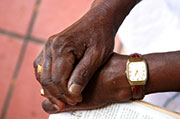- 8 Ways to Increase Dopamine Naturally
- 7 Best Breads for Maintaining Stable Blood Sugar
- Gelatin vs. Collagen: Which is Best for Skin, Nails, and Joints?
- The Long-Term Effects of Daily Turmeric Supplements on Liver Health
- Could Your Grocery Store Meat Be Causing Recurring UTIs?
- Are You Making This Expensive Thermostat Error This Winter?
- Recognizing the Signs of Hypothyroidism
- 10 Strategies to Overcome Insomnia
- Could Artificial Sweeteners Be Aging the Brain Faster?
- Techniques for Soothing Your Nervous System
Three Groups Miss Out on Colon Cancer Survival Gains, Study Says


Survival rates for white and Asian patients with advanced colon cancer have improved significantly, but the benefits haven’t extended to blacks and Hispanics, according to an American Cancer Society study.
The researchers also found that survival rates for white patients aged 65 and older did not increase as much as for those aged 20 to 64.
The findings suggest a need to increase access to new treatments for patients in these minority groups as well as for older patients, the study authors said.
“We know from previous studies that when people of any race get equal care they have similar outcomes. But studies show there are significant inequalities in the dissemination of new treatments, likely leading to the gaps in survival our analysis found,” said study leader Dr. Helmneh Sineshaw.
For the study, published in the January issue of the journal Cancer Causes and Control, the investigators analyzed data from nearly 50,000 people with advanced colorectal cancer who were included in National Cancer Institute registries.
Five-year survival rates among whites rose from less than 10 percent in the years 1992-1997 to nearly 16 percent in 2004-2009. During the same time frame, survival rates among Asian patients increased from about 11 percent to almost 18 percent, the study found.
But the picture was less rosy for blacks and Hispanics. Survival rates rose only from 8.6 percent to 9.8 percent among blacks and from 14 percent to 16.4 percent among Hispanics during the study period. Those increases were not statistically significant, the researchers pointed out.
“The reasons why ethnic minorities are not getting equal treatment are complicated, but likely include poorer health coming into the system, and lower socioeconomic status, which clearly leads to barriers to good health care. Those same factors likely lead to less aggressive treatment for older patients, as well,” Sineshaw explained in a journal news release.
Dr. Richard Wender, chief cancer control officer of the cancer society, said the study reveals what happens when not everyone is given the best care available.
“We need a concerted effort to make sure all Americans, regardless of skin color, age, or socioeconomic status, reap the lifesaving benefits of better care,” Wender said in the news release.
More information
The U.S. National Cancer Institute has more about colorectal cancer.
Source: HealthDay
Copyright © 2026 HealthDay. All rights reserved.










